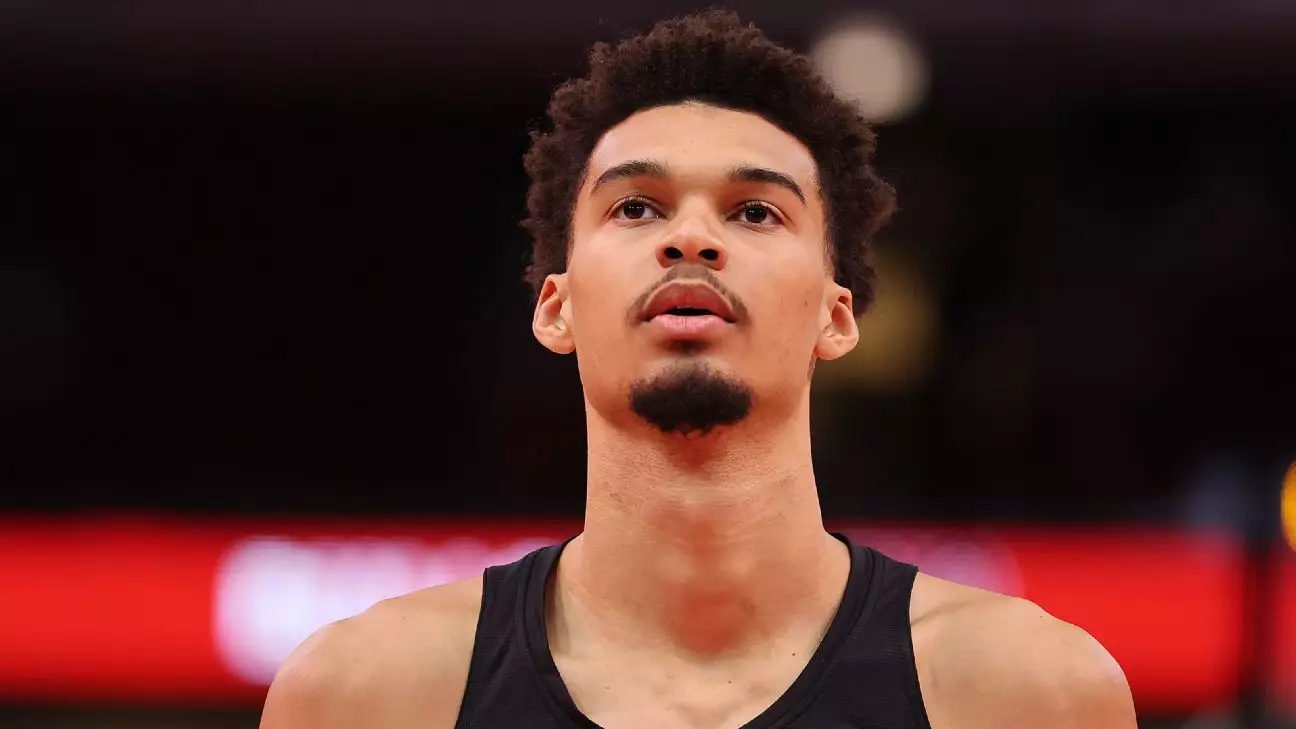The San Antonio Spurs have faced yet another adversity as their young star, Victor Wembanyama, has been diagnosed with deep vein thrombosis (DVT) in his right shoulder, sidelining him for the remainder of the NBA season. This unforeseen circumstance not only disrupts Wembanyama’s promising career but also raises questions about the immediate future for the Spurs and their aspirations in the league.
Upon returning to San Antonio after the All-Star Game, Wembanyama began experiencing unsettling symptoms. Initially, he hoped that a brief respite would alleviate his discomfort, but the persistence of these symptoms prompted further examination. The diagnosis revealed a serious medical condition that typically warrants careful treatment, including blood-thinning medications. For a professional athlete, this can mean an extended hiatus from the sport they love, making it a daunting adjustment both physically and mentally.
The impact of this diagnosis is monumental—not just for Wembanyama, but for the entire Spurs organization. Team members and coaching staff alike acknowledged the profound loss of his presence. As Chris Paul noted, “It’s tough more than anything,” emphasizing the emotional and professional ramifications of losing a player of Wembanyama’s caliber. His performance thus far has made him a key player, pivotal not only in scoring but also in generating excitement both on and off the court.
Before his diagnosis, Victor Wembanyama had already made significant strides in his rookie season. Averaging 24.3 points, 11.0 rebounds, and 3.7 assists per game, he had positioned himself as a leading contender for several awards, including Defensive Player of the Year. His impressive statistics, especially as a shot-blocker with 3.8 blocks per game, have drawn comparisons to some of the great defensive players in NBA history. However, due to the game’s minimum requirement of 65 games to be eligible for major accolades, Wembanyama will miss out on these honors, a bitter pill for both the player and his devoted followers.
Wembanyama’s absence presents an enormous gap in the Spurs roster. His notable agility and defensive prowess brought a unique flair to the team’s dynamic, and his contributions exceeded mere numbers. Despite being a rookie, he embodied vital leadership qualities, establishing a rapport with teammates and demonstrating a genuine love for the game. The Spurs will undoubtedly need to fill this void, but as Paul remarked, “you can’t replace Vic.” The team’s next steps will involve adjustments that enable other players to step up in his absence while maintaining a cohesive team spirit.
Looking ahead, the Spurs have expressed optimism regarding Wembanyama’s recovery timeline, with hopes for his return in time for the 2025-26 season. Such projections bring a ray of hope for fans and the franchise alike, as the prospect of a full recovery could mean that Wembanyama will come back rejuvenated and eager to reclaim his status in the league.
As the Spurs navigate this unexpected turn of events, they will need to rethink their strategy moving forward. Coach Gregg Popovich’s health struggles earlier in the season marked a significant challenge, and now the team must grapple with Wembanyama’s absence. However, during trials like these, the resilience of an organization is tested. The Spurs have a history of recovering from setbacks, often emerging stronger.
Victor Wembanyama’s diagnosis of deep vein thrombosis not only disrupts one of the NBA’s most promising rookie careers but represents a significant challenge for the San Antonio Spurs as they strive to keep their season afloat. The adjustments made by the team will be crucial in maintaining competitive spirit, and the recovery journey of Wembanyama will be closely monitored by fans and analysts alike. This situation serves as a reminder of the unpredictable nature of sports and the resilience required to navigate the uncertainties that come with professional athletics.


Leave a Reply